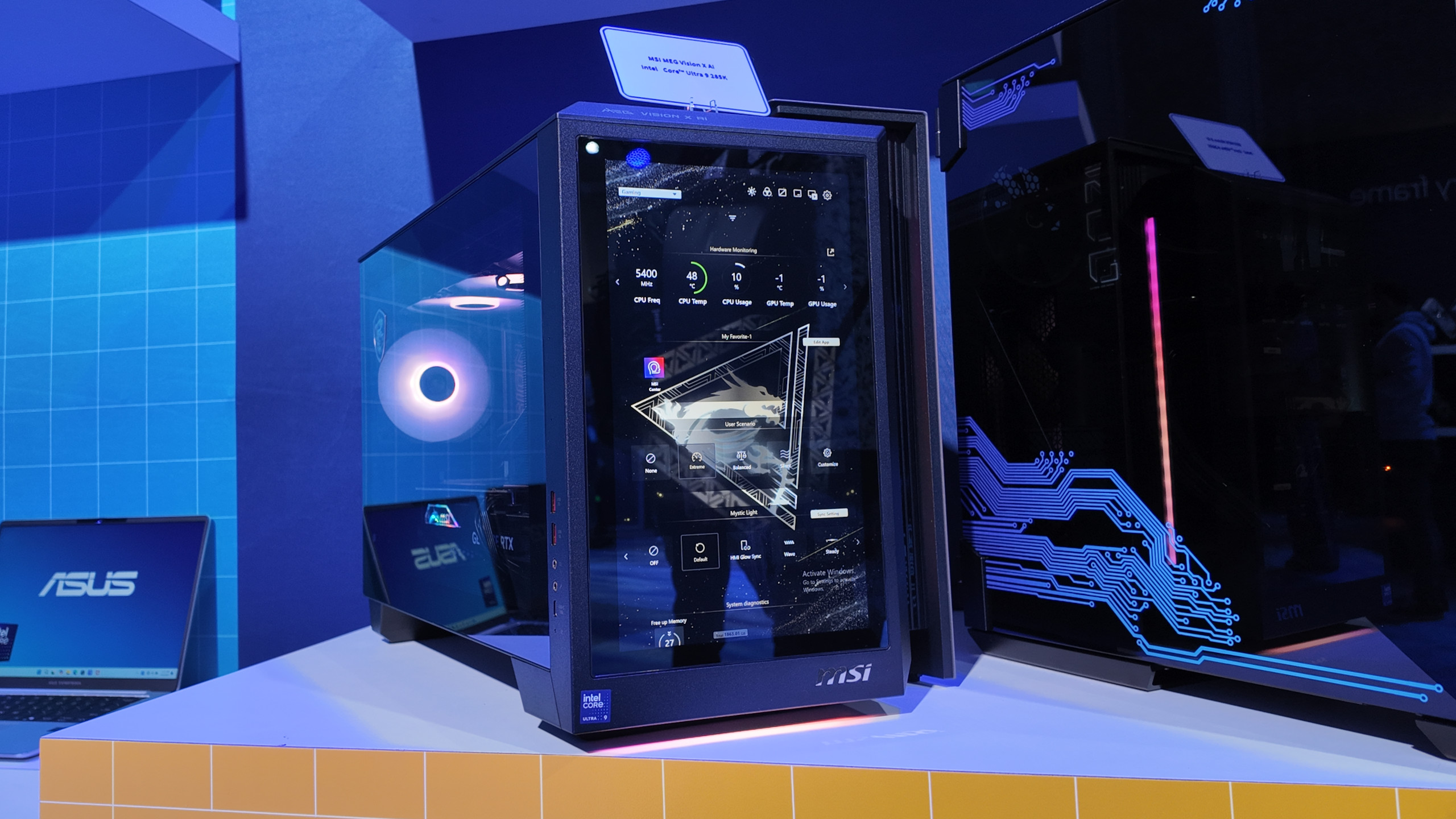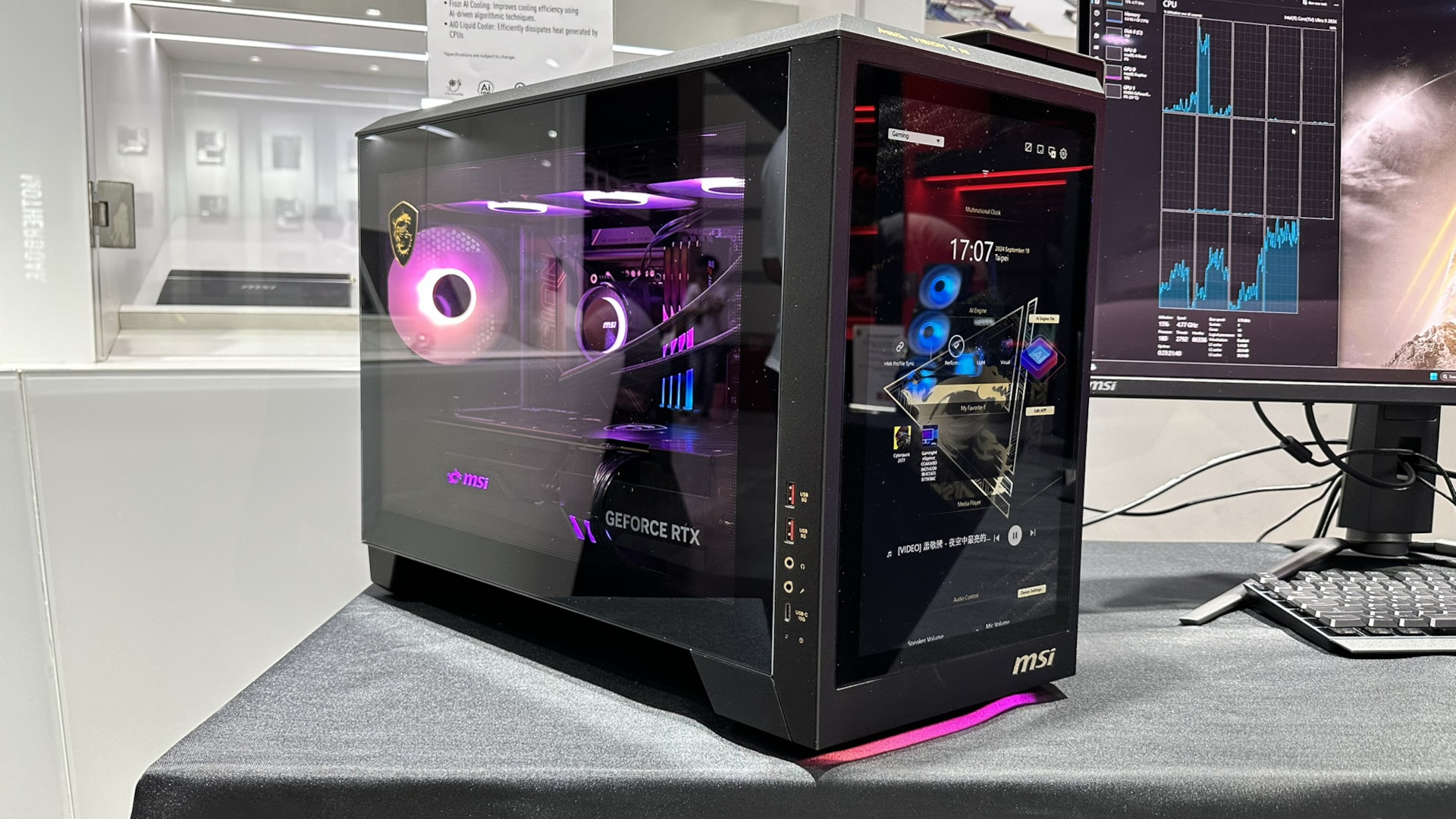MSI's spangly MEG Vision X AI desktop PC is just the ticket for anyone wanting to recreate that Scotty scene in Star Trek IV
'Hello, computer? Why is everything all AI? I just want transparent aluminum.'

The OEM desktop PC market is a tough one to stand out in and erstwhile PC mega manufacturer MSI has been trying for years with all kinds of designs, to little success. But at CES 2025, it showcased what it claims to be the ultimate desktop PC—sorry, Ultimate AI Gaming Desktop—in the form of the MEG Vision X AI, replete with countless AI features and a huge, voice-activated touchscreen.
I first saw this model in October of last year during MSI's Shenzhen factory tour. Other than now sporting one of Nvidia's new RTX 50-series graphics cards, the overall design and specs haven't changed. You get an Intel Core Ultra 9 285K in all variants, but the exact model of GPU, amount of RAM, and storage will depend on how much cash you want to hand over.
I've not seen any prices yet but given that MSI's top-end desktop PCs are all extremely expensive, you can be certain that this one will be too. To help you part from your hard-earned money, the feature that will certainly grab your attention is the 13.3-inch IPS touchscreen on the front panel.
Its specs aren't super high-end—1080p resolution, 60 Hz refresh rate—but it looks better in real life than it does in pictures. I found it very easy to use, being fast and responsive to touch. Not that MSI really wants you to be poking it for everything because the screen's big party piece is voice control.
Thanks to its built-in microphone and speakers, as well as MSI's ubiquitous AI software, one should be able to yell all kinds of commands at it and get the desired response. I wasn't able to test it when I used it (the feature wasn't available at the time and I was far more interested in playing around with its Arrow Lake chip) but if it works properly, then it could be kinda neat.
"Show me GPU temperatures," for example. "What's the weather like tomorrow? How do I make transparent aluminum?"

Yes, indeed. Forget the RTX 50-series GPU and all its AI-powered wizardry. Forget the Core Ultra 9 285K (which won't be hard). Now you can have a pre-built desktop gaming PC that you can fully relive that Scotty scene in Star Trek IV: The Voyage Home. The MEG Vision X AI is anything but quaint, though.
The biggest gaming news, reviews and hardware deals
Keep up to date with the most important stories and the best deals, as picked by the PC Gamer team.
I have to say that while MSI's design is by far one of the better ones it has created in recent years, the sheer amount of AI-in-your-face rather puts me off. Do you really need your gaming PC's lighting, fans, and power settings controlled by AI? Surely the normal software that we already have does the job just fine. One can ignore it all, thankfully, but then what are you left with? Minus all the AI stuff, the MEG Vision X is just a fairly normal gaming PC with a touchscreen.
Still, the design is rather nice and the quality is genuinely top-notch. And I kinda like the idea of yelling at a computer to do things. Wait, I already do that. I guess the difference is that the MSI MEG Vision X AI might actually do something rather than mine all just sitting there pretending to ignore me.
Catch up with CES 2025: We're on the ground in sunny Las Vegas covering all the latest announcements from some of the biggest names in tech, including Nvidia, AMD, Intel, Asus, Razer, MSI and more.

Nick, gaming, and computers all first met in 1981, with the love affair starting on a Sinclair ZX81 in kit form and a book on ZX Basic. He ended up becoming a physics and IT teacher, but by the late 1990s decided it was time to cut his teeth writing for a long defunct UK tech site. He went on to do the same at Madonion, helping to write the help files for 3DMark and PCMark. After a short stint working at Beyond3D.com, Nick joined Futuremark (MadOnion rebranded) full-time, as editor-in-chief for its gaming and hardware section, YouGamers. After the site shutdown, he became an engineering and computing lecturer for many years, but missed the writing bug. Cue four years at TechSpot.com and over 100 long articles on anything and everything. He freely admits to being far too obsessed with GPUs and open world grindy RPGs, but who isn't these days?


